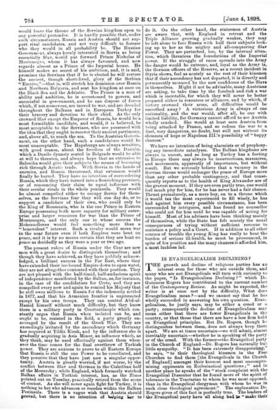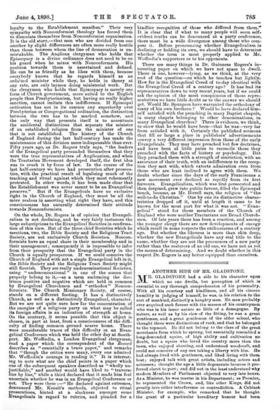IS EVANGELICALISM DECLINING? T HE growth and decline of religious parties
has an interest even for those who are outside them, and many who are not Evangelicals will turn with curiosity to the paper, "Is Evangelicalism Declining ?" which Dr. Guinness -Rogers has contributed to the current number of the Contemporary Review. As might be expected, the writer is at once met by the difficulty, What does Evangelicalism mean ?—and we cannot say that he has wholly succeeded in answering his own question. Evan- gelicalism, he justly says, may be either a creed or a party; consequently the decline of Evangelicalism may mean either that there are fewer Evangelicals in the country, or that those that there are have a less firm hold on Evangelical principles. But Dr. Rogers, though he distinguishes between them, does not always keep them apart. We are at times uncertain—we will admit, almost inevitably uncertain—whether he is speaking of the party or of the creed. With the former—the Evangelical party in the Church of England—Dr. Rogers has naturally but little sympathy. "It has been extremely disappointing," he says, " to their theological kinsmen in the Free Churches to find them [the Evangelicals in the Church of England] amongst their keenest and most uncompro- mising opponents on Ecclesiastical questions ; " and in another place he speaks of the "stock complaint with the Evangelical Dissenter that he found more of the spirit of tolerance in the Tractarian to whom he was most opposed, than in the Evangelical clergyman with whom he was in such close theological agreement." The explanation Dr. Rogers gives of this fact is perfectly true. The leaders of the Evangelical party have all along had to "make their loyalty to the Establishment manifest." Their very sympathy with Nonconformist theology has forced them to dissociate themselves from Nonconformist organisation. It is the old story,—that men who are divided from one another by slight differences are often more really hostile than those between whom the line of demarcation is un- mistakable. The Anglican clergyman who holds that Episcopacy is a divine ordinance does not need to be on his guard when he mixes with Nonconformists. His position towards them is ascertained and defined. He can be as friendly as he likes with them, because everybody knows that he regards himself as an ordained minister while they, he holds in theory at any rate, are only laymen doing ministerial work. But the clergyman who holds that Episcopacy is merely one form of Church government, more suited to the English people than Presbyterianism, but having no really higher sanction, cannot imitate this indifference. If Episcopal ordination has not in its essence any superiority over Presbyterian or Congregational ordination, the distinction between the two has to be marked somehow, and the only way that presents itself is to accentuate the accidental distinctions that separate the minister of an established religion from the minister of one that is not established. The history of the Church of England during the last half-century has made the maintenance of this division more indispensable than ever. Fifty years ago, as Dr. Rogers truly says, "the leaders of the Evangelical party persuaded themselves that they were the true representatives of Anglicanism, and when the Tractarian Movement developed itself, the first idea was to crush it by force of law. In the course of the last half-century we have had prosecution after prosecu- tion, with the practical result of legalising much of the teaching and ritual against which they most vehemently protested. In other words, it has been made clear that the Establishment was never meant to be an Evangelical preserve." But if the Evangelicals have no exclusive right in the Church of England, they must be all the more zealous in asserting what right they have, and this consciousness has naturally determined their attitude towards Nonconformists.
On the whole, Dr. Rogers is of opinion that Evangeli- calism is not declining, and he very fairly instances the large subscriptions to the Evangelical Societies in confirma- tion of this view. But of the three chief Societies which he mentions, two, the Bible Society and the Religious Tract Society, are not exclusively Church Societies. Noncon- formists have an equal share in their membership and in their management; consequently it is impossible to infer from their prosperity that the Evangelical party in the Church is equally prosperous. If we could conceive the Church of England with not a single Evangelical left in it, the Bible Society and the Religious Tract Society might still flourish. They are really undenominational Societies, using " undenominational ' in one of the senses that properly belong to it,—as a term embracing the doc- trines positive and negative which are held in common by Evangelical Churchmen and "orthodox" Noncon- formists. The Church Missionary Society, of course, stands on a different footing. It has a distinctively Church, as well as a distinctively Evangelical, character. But we are not quite sure how far the concentration of the energies of a religious party on what may be called its foreign affairs is an indication of strength at home. On the contrary, it seems possible that this object is chosen, in part at least, from a consciousness of the diffi- culty of finding common ground nearer home. There were considerable traces of this difficulty in an Evan- gelical Conference which was held the other day at South- port. Mr. Woffindin, a London Evangelical clergyman, read a paper which the correspondent of the Record describes as "essentially a brave paper," and remarks that "though the critics were many, every one admired Mr. Woffindin's courage in reading it." It is interest- ing to note what are the chief points in a paper which one of the subsequent speakers described as "wholly un- justifiable," and another would have liked to "traverse line by line," while a third declared that it made him feel uncertain whether he was in an Evangelical Conference or not. They were these :—" He declared against extremes, denounced Mr. Kensit's methods, objected to ritual prosecutions, hinted at a slackness amongst some Evangelicals in regard to rubrics, and pleaded for a kindlier recognition of those who differed from them." It is clear that if what to many people will seem self. evident truths can be denounced at a party conference, there must be a wide divergence among those who com- pose it. Before pronouncing whether Evangelicalism is declining or holding its own, we should have to determine whether the term is most properly applied to Mr. Woffindin's supporters or to his opponents.
There are many things in Dr. Guinness Rogers's in- teresting paper on which we have not space to dwell. There is one, however—lying, as we think, at the very root of the question—on which he touches but lightly. How far is the Evangelical Creed of to-day identical with the Evangelical Creed of a century ago? It has had its representatives down to very recent years, but if we could ask the opinion of the most conspicuous of those repre- sentatives we have little doubt as to the answer we should get. Would Mr. Spurgeon have warranted the orthodoxy of many of his own brethren ? Would he have declared him- self satisfied with the preaching in many Baptist chapels, in many chapels belonging to other denominations, in. many Evangelical churches? There is evidence, we think, to show that he would have been—that he was—very far from satisfied with it. Certainly the published sermons that fill so large a place in publishers' advertisements convey a very different impression from those of the early Evangelicals. They may have preached but few doctrines, and have been at little pains to reconcile those they preached with the facts of history or psychology. Rut they preached them with a strength of conviction, with an assurance of their truth, with an indifference to the recep- tion they met with, which extorts admiration even from those who are least inclined to agree with them. We- doubt whether since the days of the early Franciscans a. new movement ever declined so rapidly from its first. fervours. Evangelicalism, which was first persecuted and then despised, grew into public favour, filled the Episcopal bench, became, as Mr. Birrell says, the religion of "the well-to-do Christian." One by one its distinctive charac- teristics dropped off it, until at length it came to be known for the most part for what it was not. "Evan- gelical" stood for those members of the Church of England who were neither Tractarians nor Broad Church- men. Of late years there has been a reaction, and among; the younger clergy there are new developments of energy. which recall in some respects the enthusiasms of a century ago. But whether the likeness is more than skin deep, whether the new Evangelicals have any real title to the name, whether they are not the precursors of a new party rather than the restorers of an old one, we have not as yet the means of determining. And we doubt whether in this respect Dr. Rogers is any better equipped than ourselves.



































 Previous page
Previous page